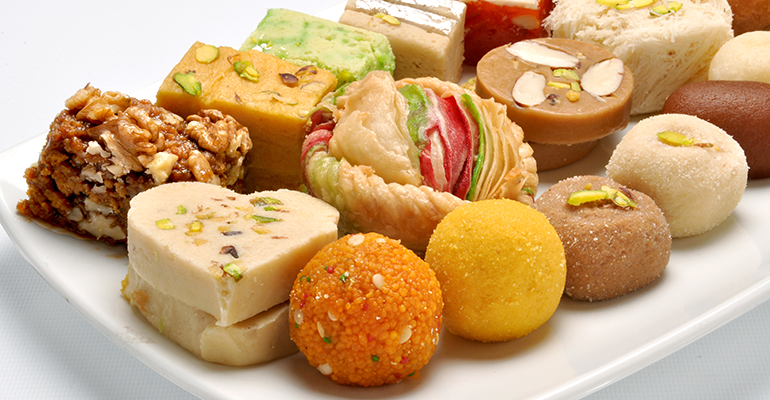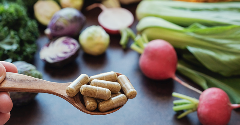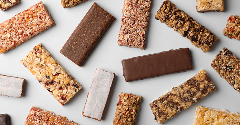News
India’s mithai market develops new ingredient and flavour profiles
18 Mar 2024Mithai is a hugely popular dessert and sweet snack in India and manufacturers are experimenting with unique ingredients, new flavour combinations, and healthier versions to capture new audiences.
According to TastePak, mithai is the Hindi and Urdu word for sweets that are often made from flour, milk, sugar, nuts and, in some cases, vegetables and lentils. They are traditionally flavoured with rose water, saffron, and cardamom.

One of the most significant changes in the mithai industry is the rise of creators experimenting with diverse ingredients, blending traditional sweets with global dessert forms. Classic Indian mithais like gulab jamun and jalebis are transforming into waffles with maple, jamun-studded French toasts, and pancakes. Consumers have the opportunity to customise sweetness levels, spice infusions, and syrups beyond rose and saffron.
As people become more health-conscious, mithai makers are incorporating natural sugar alternatives like jaggery and honey and millets like ragi, jowar, and bajra. In a nod to the permissible indulgence trend, these ingredient replacements offer a healthy alternative to traditional sweets. Eco-friendly packaging and zero-waste production goals are becoming increasingly common, reflecting a commitment to sustainability.
Festivals and seasons drive the market in India, with players increasingly moving to online and e-commerce platforms. The market for processed traditional foods in India has significant export potential, with large-scale, quality, and safe traditional sweet production playing a crucial role.
Several manufacturing processes, such as concentration, boiling, drying, extrusion, and rolling, can be used in India. However, machines that can adapt to such procedures and create the desired tastes and flavours are a significant challenge that needs to be addressed for the market to grow.
Mithai: Where sweets meet chocolate
Increasingly, brands are exploring flavour innovation in chocolate confectionery and implementing this in Mithai, traditional Indian sweets.
Market intelligence company Mintel found that a third of consumers are interested in mithai-flavoured chocolates compared to international dessert flavours. Manufacturers have the opportunity to cater to local preferences by infusing chocolates with flavours reminiscent of beloved mithais such as gulab jamun, rasgulla, and jalebi.
Brands can offer a modern twist on traditional delicacies by introducing limited edition assortment packs inspired by mithai flavours, enhancing consumer engagement. However, brands must recognise the diverse preferences across different regions in India and cater to these nuances to boost brand appeal. While flavours like gulab jamun may be more attractive to sweet shoppers in the West, those in the East may opt for rasgulla.
Moreover, chocolate brands can draw inspiration from local mithai stores that have successfully integrated desi flavours into their offerings, providing valuable insights into regional tastes.
New Mithai product developments
Khoya Mithai is expanding its product range, recently introducing the concept of luxury sweets. The Mithai sweet brand has recently launched an assorted box of Mithai in regular and sugar-free varieties to cater to health-conscious consumers. Arq Mithai has launched milk and dark chocolate truffles, bringing together India’s traditional sweet with confectionery.
Traditionally, mithai sweet shops conjure images of colourful and enchanting spaces filled with sweets. Bombay Sweet Shop aims to bring back the nostalgia and charm of traditional Mithai by reimagining Mithai flavours and textures. The local brand has introduced the Indie Bar, featuring layers of pepper caramel, coconut fluff, patissa/soan papdi (a local sweet delicacy), and dark chocolate. The brand’s chefs experimented with soan papdi and recognised its potential for inclusion in a chocolate bar.
The company has sought to “elevate nostalgia” and create gourmet sweets to meet today’s consumer demands. Bombay Sweet Shop’s Chocolate Butterscotch Barks is its best-seller, with a 60% repeat rate and contributing 30% of sales, while its assorted mithai box comes in at a close second.
In a relatively short period, Bombay Sweet Shop has seen significant sales increases, experiencing 120% monthly growth during Rakhi 2023 and 500% during Diwali 2022. The company anticipated 600% month-on-month growth for Diwali 2023.
Related news

Food ingredients drive growth in beauty supplements
15 Mar 2024
As Japanese cosmetics giant Shiseido partners with a food ingredient supplier for the launch of its “inner wellness” division, food-based extracts are playing a defining part in beauty-from-within supplement launches in Asia and beyond.
Read more
Singapore's Islamic council: Cultivated meat can be halal
16 Feb 2024
The Islamic Religious Council of Singapore (MUIS) has said that cultivated meat consumption is permissible as halal under certain conditions, and where a more “rigorous” set of requirements are needed to ensure consumer assurance.
Read more
China needs maximum sodium targets for packaged foods, say researchers
8 Feb 2024
Packaged and processed foods now contribute to nearly one-third of Chinese people’s sodium intake, prompting researchers to call for maximum sodium reduction targets for manufacturers.
Read more
South-East Asia: Renewed interest in sports nutrition products
19 Dec 2023
South-East Asia’s renewed focus on the elderly has also given rise to an emerging sports nutrition sector that serves to address similar health issues such as immune support and bone and joint health.
Read more
Insect protein market heats up in APAC region
12 Jun 2023
Packed with superfood-level nutritional benefits and with a neutral taste, Asian brands are using insect protein in finished products, such as Thailand’s Proothie, which makes cricket protein granola bars.
Read more